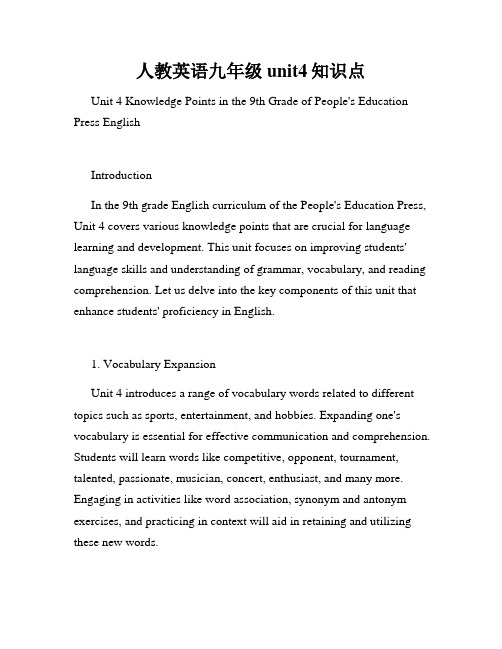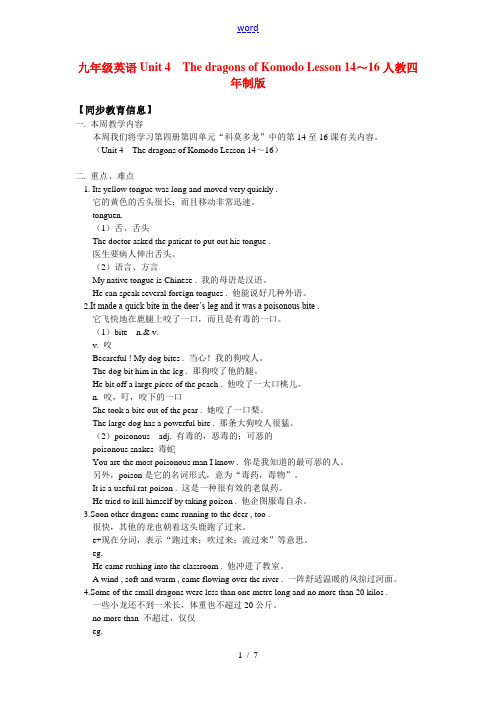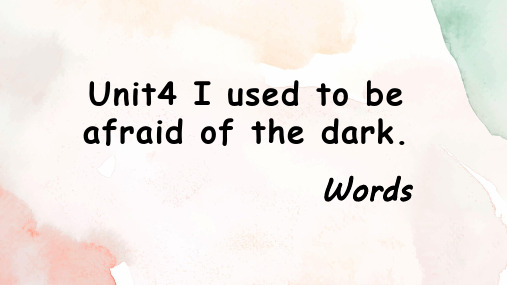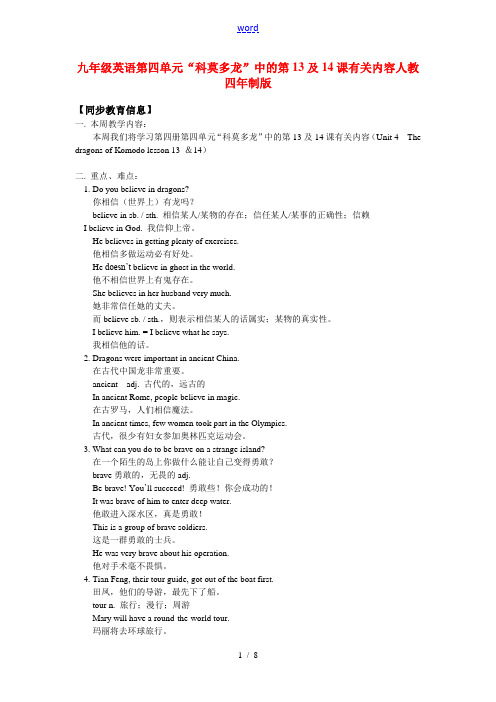九年级英语 Unit 4 The dragons of Komodo 人教四年制版
人教英语九年级unit4知识点

人教英语九年级unit4知识点Unit 4 Knowledge Points in the 9th Grade of People's Education Press EnglishIntroductionIn the 9th grade English curriculum of the People's Education Press, Unit 4 covers various knowledge points that are crucial for language learning and development. This unit focuses on improving students' language skills and understanding of grammar, vocabulary, and reading comprehension. Let us delve into the key components of this unit that enhance students' proficiency in English.1. Vocabulary ExpansionUnit 4 introduces a range of vocabulary words related to different topics such as sports, entertainment, and hobbies. Expanding one's vocabulary is essential for effective communication and comprehension. Students will learn words like competitive, opponent, tournament, talented, passionate, musician, concert, enthusiast, and many more. Engaging in activities like word association, synonym and antonym exercises, and practicing in context will aid in retaining and utilizing these new words.2. GrammarGrammar plays a vital role in constructing and organizing sentences effectively. Unit 4 emphasizes the correct usage of various tenses, active and passive voice, and reported speech. Students will gain a deeper understanding of how to express actions in the past, present, and future, how to transform sentences from active to passive voice, and how to report information accurately. Practical exercises, paired or group activities, and constant practice will help students develop their grammar skills.3. Reading ComprehensionDeveloping reading comprehension skills is crucial for understanding written texts and gathering information. Unit 4 presents students with captivating passages, articles, and stories relevant to the unit's theme. Students will be encouraged to read actively, identify key details, enhance critical thinking, and infer information from the text. Questions and tasks related to the reading materials will assess students' comprehension skills and prompt them to think critically about the content.4. Listening and SpeakingEffective communication requires not only the ability to understand spoken language but also to express oneself clearly. Unit 4 introduceslistening exercises that focus on comprehension of different accents, expressions, and intonations. By practicing listening activities, students will develop their ability to follow instructions, understand dialogues, and grasp important details. Moreover, the unit provides opportunities for students to engage in discussions, express their opinions, and give presentations. These speaking tasks encourage students to improve their fluency, pronunciation, and overall speaking skills.5. WritingWriting is an essential skill that allows students to express their ideas and thoughts coherently. In Unit 4, students will enhance their writing skills by learning how to write formal and informal letters, descriptions, and summaries. Through practice, students will refine their abilities in organizing their ideas logically, using appropriate vocabulary and grammar structures, and presenting information effectively. Peer reviews and feedback from teachers will aid students in improving their writing style and accuracy.ConclusionUnit 4 of the 9th grade English curriculum from the People's Education Press encompasses crucial knowledge points that are integral to the development of students' language skills. From expanding vocabulary to mastering grammar, reading comprehension, listeningand speaking, and writing, this unit provides a comprehensive approach to language learning. By practicing and applying these knowledge points, students will enhance their overall English proficiency and confidently engage in various language-related tasks.。
九年级英语Unit 4 The dragons of Komodo Lesson 14~16人教四

九年级英语Unit 4 The dragons of Komodo Lesson 14~16人教四年制版【同步教育信息】一. 本周教学内容本周我们将学习第四册第四单元“科莫多龙”中的第14至16课有关内容。
(Unit 4 The dragons of Komodo Lesson 14~16)二. 重点、难点1. Its yellow tongue was long and moved very quickly .它的黄色的舌头很长;而且移动非常迅速。
tonguen.(1)舌、舌头The doctor asked the patient to put out his tongue .医生要病人伸出舌头。
(2)语言、方言My native tongue is Chinese . 我的母语是汉语。
He can speak several foreign tongues . 他能说好几种外语。
2.It made a quick bite in the deer’s leg and it was a poisonous bite .它飞快地在鹿腿上咬了一口,而且是有毒的一口。
(1)bite n.& v.v. 咬Becareful ! My dog bites . 当心!我的狗咬人。
The dog bit him in the leg . 那狗咬了他的腿。
He bit off a large piece of the peach . 他咬了一大口桃儿。
n. 咬,叮,咬下的一口She took a bite out of the pear . 她咬了一口梨。
The large dog has a powerful bite . 那条大狗咬人很猛。
(2)poisonous adj. 有毒的,恶毒的;可恶的poisonous snakes 毒蛇You are the most poisonous man I know . 你是我知道的最可恶的人。
2024年人教版九年级英语上册Unit 4第五课时 Section B (2a—3b)

第五课时Section B (2a—3b)教学目标通过本课的学习,学生能够:1.获取本课语篇中描述自己或他人今昔对比的相关信息;理解并掌握本课时重点词汇:absent、fail、exactly、be proud of、take pride in等。
(获取信息)2.使用读前、读中和读后的阅读策略对语篇信息进行结构性梳理,提高阅读能力;在真实情景中体会运用used to结构描述过去与现在变化的用法;同时在写作中,注意语篇的整体性、结构性和逻辑性。
(梳理整合)3.创造性地表达自我,提高跨文化交际意识。
(内化应用)4.在学习语言的同时,明白事物在不断发展、变化的道理,培养积极向上的心态。
珍惜父母及亲人对自己的爱,努力学习回报社会。
(迁移创新)语篇研读What:本课语篇通过讲述一位乡村少年李文过去与现在的情况变化对比,描述了他的成长故事。
Why:作者通过描述主人公变化成长的故事,目的在于唤起学生们的关爱之心,懂得体会亲情的可贵,学会理解父母。
How:语篇通过介绍主人公的背景、出现的问题以及通过和父母的交流最后发生转变的过程,让学生明白事物是在不断发展、变化的道理;同时通过课堂活动的体验,学生能够创造性地表达自我,提高跨文化交际的意识。
教学过程设计理念:以《义务教育英语课程标准(2022年版)》核心素养为导向,以单元主题为引领,基于语篇的育人理念,体现《义务教育英语课程标准(2022年版)》“学单元所学的重点词汇与句型进行写作训练。
通过写作培养学生的书面表达能力【应用实践】板书设计Unit 4I used to be afraid of the dark.Section B (2a—3b)作业设计基础型作业:Review the words and phrases.实践型作业:Work with you partner to finish 2f on page 31.拓展型作业:Use the language in this unit to write a letter to your parents. (You should show your love to them and tell them how you will change yourself better.) 教学反思。
+Unit4词汇课件2024-2025学年人教版九年级英语全册+

How should I deal with this problem? = What should I do with this problem?
05 require v. 需要;要求 1).The job requires strength. 这份工作需要体力。 require sth. 需要某物 The car requires/ needs washing/to be washed. 这辆汽车需 要清洗。
Unit4 I used to be afraid of the dark.
Words
01 silent adj. 不说话的;沉默的 silently adv. 我不喜欢晚上寂静的时间。 I don’t like the silent hours of the night.
Please look at the sign. It says “keep silent”. keep/stay silent 保持沉默
D. get ready for
take pride in +名词\代词\动词-ing = be proud of+名词\代词 为…感到自豪
年轻的妈妈为她儿子感到自豪。
The young mother took pride in her son.
=The young mother was proud of her son.
silence n. 安静;沉默 silently adv. 沉默地;安静地
They finished homework in silence/silently . in silence 安静地;无声地
九年级英语第四单元“科莫多龙”中的第13及14课有关内容人教四年制版知识精讲

九年级英语第四单元“科莫多龙”中的第13及14课有关内容人教四年制版【同步教育信息】一. 本周教学内容:本周我们将学习第四册第四单元“科莫多龙”中的第13及14课有关内容(Unit 4 The dragons of Komodo lesson 13 &14)二. 重点、难点:1. Do you believe in dragons?你相信(世界上)有龙吗?believe in sb. / sth. 相信某人/某物的存在;信任某人/某事的正确性;信赖I believe in God. 我信仰上帝。
He believes in getting plenty of exercises.他相信多做运动必有好处。
He doesn’t believe in ghost in the world.他不相信世界上有鬼存在。
She believes in her husband very much.她非常信任她的丈夫。
而believe sb. / sth.,则表示相信某人的话属实;某物的真实性。
I believe him. = I believe what he says.我相信他的话。
2. Dragons were important in ancient China.在古代中国龙非常重要。
ancient adj. 古代的,远古的In ancient Rome, people believe in magic.在古罗马,人们相信魔法。
In ancient times, few women took part in the Olympics.古代,很少有妇女参加奥林匹克运动会。
3. What can you do to be brave on a strange island?在一个陌生的岛上你做什么能让自己变得勇敢?brave勇敢的,无畏的adj.Be brave! You’ll succeed! 勇敢些!你会成功的!It was brave of him to enter deep water.他敢进入深水区,真是勇敢!This is a group of brave soldiers.这是一群勇敢的士兵。
英语人教PEP版九年级(上册)unit4SectionA3a-3c(2024版新教材)

3c Suppose you are the interviewer
and your partner is Candy. Ask and answer questions.
Can you guess what she was like in the past?
3a Read the article and identify the paragraphs [1-3] in which the information appears.
__2__ how Candy’s life has changed __3__ Candy’s advice to young people __1__ Candy’s background
Para. 2 Life was different after she became famous. good things: travel and meet ... get tons of attention... bad things: worry about... don’t have private time... guards around ...
Para. 3 Advice: be prepared to ... the road to success... require... make it to the top
3b Complete the sentences about Candy.
1. She used to be shy, but now she’s not shy _a_n_y_m__o_re__.
2024年人教版九年级英语上册Unit 4第一课时 Section A (1a—2d)
第一课时Section A (1a—2d)教学目标通过本课的学习,学生能够:1.获取本课有关描述人物过去的性格、外貌等的基本句型以及重点词汇:humorous、silent、score等。
(获取信息)2.运用阅读题干信息预测听力内容等听力策略对语篇信息进行梳理,并在创设的主题语境中正确理解目标语言的运用。
(梳理整合)3.正确表述过去的经历和习惯,认识到关注自我发展和自我完善的重要性。
(内化应用)4.借助小组活动,在合作探究中增进团队合作精神,并积极进行自我管理,达到自我提升。
(迁移创新)语篇研读What:本课语篇是四组对话,对话通过对人物性格特点和相貌的今昔对比让学生感知本课语言结构。
1b听力材料模拟生活情景,围绕相貌变化展开对话;2a、2b的对话则围绕性格、爱好变化展开对话;2d是Alfred和Gina就Billy在外貌、性格以及兴趣等方面发生的变化展开对话。
Why:通过对话帮助学生深刻体会used to在日常交际中的运用,进一步加强对学生听说能力的训练并拓展语言知识,培养阅读技能及阅读策略,让学生明白事物在不断发展、不断变化,培养学生积极向上的心态。
How:本课语篇采用对话方式,借助主题图创设的语境,模拟真实的生活场景,引导学生开展对话操练。
通过倾听关于今昔变化的对话,让学生体会used to在真实的日常交际中的运用,进而理解其功能意义。
教学过程设计理念:以《义务教育英语课程标准(2022年版)》核心素养为导向,以单元主题为引领,基于语篇的育人理念,体现《义务教育英语课程标准(2022年版)》“学思用创”的英语学习活动观和“教—学—评”一体化设计理念。
教学目标学习活动效果评价Lead-in通过照片讨论外貌、性格等方面的变化,为后面的学习做铺垫According to the pictures,describethe changes of a person’s appearanceand personality:He used to…,but he…now.观察学生的表现,预判学生的能力,并根据学生的回答情况给予帮助和鼓励设计意图通过描述他人的外貌、性格变化,激发学生的表达欲望,从而更快地进入学习主题Activity1:Pre-listening完成表格填写,学习相关表达1.Work on1a.Fill in the chart with words todescribe people.2.Read the words and phrases.观察学生能否完成听力任务,并给出指导设计意图听前通过填写表格复习相关单词,熟悉听力1b中出现的单词,降低听力的难度,为接下来的听力活动做铺垫【学习理解】Activity2: While-listening通过听力完成填空Work on1b.Listen.Bob is seeing some friends forthe first time in four years.What didhis friends use to look like?观察学生能否准确完成练习,并给出指导设计意图通过练习,锻炼学生抓取关键信息的能力;同时感受used to结构的用法【学习理解】Activity3:Pair work对话练习,对used to 结构进行巩固训练Work on1c.Look at the picture in1a and make conversations.观察学生是否能够举一反三进行对话练习,并给出指导设计意图通过两人合作,创设口语活动,内化语料内容,操练目标对话,为后面的练习作铺垫【应用实践】Activity4:Work on2a&2b再次通过听力练习,获取有效信息1.Work on2a.Listen and check(√)the words youhear.2.Work on2b.Listen again and complete the chartabout how Paula has changed.观察学生能否准确获取具体信息,并且根据学生完成情况给出指导设计意图通过多种听力题型的练习,学生培养在听中捕捉所需信息的能力,引导学生进一步掌握听力做题技巧【学习理解】Activity5:Pair work对话练习,对文本内容进行深度解析Work on2c.Make conversations about Paulausing the information in2b.观察学生能否合理构建对话,培养学生的语言应用能力设计意图通过口语输出和合作学习,复习巩固目标语言used to结构的意义及用法【应用实践】Activity6:Work on2d深度学习,知识迁移1.Work on2d.Role-play the conversation.2.Read the conversation and fill in观察学生完成任务的情况,根据学生的表现给出指the blanks.导和反馈设计意图检测学生对本课对话内容的掌握情况及对语言的综合运用能力,让学生明白事物是在不断发展、变化的道理,引导学生关注自我发展和自我完善,培养积极向上的心态【应用实践】板书设计Unit 4I used to be afraid of the dark.Section A (1a—2d)作业设计基础型作业:Review the phrases and sentences of this class.实践型作业:Write a short passage about Billy’s change according to the conversation in 2d.拓展型作业:Draw two pictures of your friend before and now,then describe them to your classmates.教学反思。
人教九年级英语unit4知识点
人教九年级英语unit4知识点Unit 4 Knowledge Points in Ninth Grade English TextbookAs ninth-grade students studying the English language, it is important for us to grasp the knowledge points within each unit. In this article, we will explore the key concepts and information covered in Unit 4 of our textbook. Let's dive in!1. Vocabulary Expansion:Unit 4 introduces us to a range of new vocabulary words, allowing us to expand our language skills. These words include "ambition," "athlete," "boundary," "duty," and "status." It is crucial to understand the meaning and usage of these words, as they will greatly enhance our comprehension and communication abilities.2. Grammar Excursion:One essential grammar concept covered in this unit is the past simple and past continuous tense. It is crucial to differentiate between the two and understand when to use each one. While the past simple tense refers to a completed action in the past, the past continuous tense emphasizes an ongoing action or an interrupted action in the past. Mastering this grammar point will provide us with the foundation toconstruct accurate and coherent sentences when discussing events or actions in the past.3. Reading Comprehension:Unit 4 revolves around the theme of ambition and success. Through various reading passages, we are exposed to inspiring stories of individuals who have overcome challenges to achieve their dreams. These passages not only improve our reading skills but also broaden our horizons by introducing us to different perspectives and experiences.4. Listening Practice:In Unit 4, we are given the opportunity to practice our listening skills through audio recordings. These recordings cover a range of topics related to ambition and success. By listening carefully and following the instructions, we can improve our ability to comprehend spoken English and sharpen our listening comprehension skills. Remember to take notes and pay attention to details while listening to the recordings.5. Writing Development:Unit 4 also encourages us to develop our writing skills. We are provided with writing tasks that allow us to express our ideas, opinions, and personal experiences. Through these activities, we can enhance our ability to communicate effectively in writing, employing proper grammatical structures and appropriate vocabulary.6. Cultural Insights:In addition to language skills, Unit 4 provides us with insights into different cultures. By exploring the stories and experiences of individuals from various backgrounds, we can develop a better understanding and appreciation for diversity. This cultural awareness not only broadens our knowledge but also promotes empathy and understanding towards others.7. Critical Thinking:Unit 4 challenges us to think critically and analyze the content we encounter. Through discussion questions and reflection activities, we are prompted to evaluate various aspects of ambition, success, and the pursuit of dreams. These exercises encourage us to develop our analytical skills and think beyond the surface level, fostering a deeper understanding of the topics covered.In conclusion, Unit 4 of our ninth-grade English textbook offers a wide range of knowledge points that are crucial to our language development. From vocabulary expansion to grammar exercises, reading comprehension to listening practice, writing development, cultural insights, and critical thinking, this unit provides a comprehensive learning experience. By dedicating ourselves to understanding and mastering these concepts, we can enhance our English language skills and cultivate a broader perspective on the world around us.。
人教版九年级英语Unit4知识点精讲和练习题.doc
新目标九年级Unit 4课前检测一、重点单词1.幽默的2.看守,守卫n&v3.沉默的4.很少5.得分,进球6.影响7.背景8.缺席的,不在9.面试;采访10.失败,不及格11.亚洲的,亚洲人12.考试,审查12.人群,观众14.确切地,精确地15.私人的16.自豪的17.需要,要求18.普遍的;将军19.讲话,发言n. 20.介绍n.二、重点短语1.过去常做某事2.为…感到自豪:3.应对:处理4.做决定5.公开地6.考试不及格7.缺席8. 一般來说9.亲自;亲身10 •保持沉默11.开始做,从事;占据12.受到大量关注13.演讲14.有时15.在游泳队里16 •如此好的主意17. a number of... 18. at least19. advise sb to do sth 20. have a great influence on sb三、重点句型(必背句型)1.…You used to be short. you?…Yes. I •2. It (be) three years since we last saw our primary school classmates.3. His face (turn) red when he talked to girls. I used to see him (read)in the library every day.4. Candv told me that she used to be really shv and took up singing (deal) with her shyness.5. (hang) out with friends (be) almost impossible for me now.6.You really require a lot of talent and hard work _____ ( succeed). Only a very small number of people make it to the top.7.If s hard ________ (believe) that he used to have difficulties in school.!.8.Sometimes he was absent from classes and ______ ( fail) his examinations.9.She advised them _______ (talk) with their son in person.10.My life _________ (change) a lot in the last few years.四、重点语篇From Shy Girl to Pop StarThe Young World magazine i _______ 19-year-old pop star Candy Wang, who used to be shy and t ____ up singing to deal with her s ___ ・ Now she d ___ t o sing in front of thew ____ school and crowds. And she gets t ____ of attention everywhere she goes. However, she has to be very c _______ about w ___ I say or do. And she doesn^t have much p _______ time anymore. ______ (hang) out with friends is almost i __________ b ecause of the guards. Also, being a singer is difficult and people have to be prepared ____________ (give) up their normal life. It r ______ a lot of talent and hard work. Only a very small number of peoplem ___ it to the top.He Studies Harder Than He Used toLi Wen, a 15-year-old boy from the countryside, works very hard and d _____ well in school. It is hard _______ (believe) that he used to have difficulties. When his parents moved to the city to work, he missed them so much that he often felt 1 _____ and unhappy, which greatly i _____ his schoolwork. He was sometimes a _____ from classes. Then his parents made the d ________ to send him to a boarding school. Finding the life there d ____________ , Li Wen wanted to leave the school. His teacher a ______ his parents to talk with their son in p _____ , It was e _____ what he needed. He realized that his parents would always love him and takep ____ in everything that he did. Now he is m ___ happier than he used to be.考点知识梳理ed to do sth.; be used to doing sth; be used to do sthused to do sth意为"过去常常做某事”.used to的疑问句形式是"Did…use to d o?”或"Used...to do"; used to的反意疑问句也用助动词did(n't)或used(nl)构成。
Unit4+重点知识详解 人教版九年级英语全册+
Unit4 知识点详解一、silent(1) silent是形容词,意为“____________________”。
常用短语:______________ 保持沉默___________________沉默[拓展]①silent的名词形式是_______________,意为“沉默;寂静”。
常用短语:__________________沉默地,不语地②以-t结尾的形容词,变名词为-ce的有:confident(有信心的)-confidence(信心)different(不同的)-difference(差别)important(重要的)-importance(重要性)patient(有耐心的)-patience(耐心)二、It has been/is+一段时间+since+从句It has been/+一段时间+since+从句,意为“自从……以来已经有多长时间了”,还可表示为“It is+一段时间+since+从句”。
三、take uptake up的三种含义(1)take up意为“学着做;从事;开始做”,其后常跟名词或动词_________形式做宾语。
(2)take up还可意为“占据(空间);占用(时间)”。
[注意] take up如果后跟代词做宾语,代词必须放在take和up之间;如果后跟名词做宾语,名词既可放在up之后,也可放在take和up之间。
四、deal with(1) deal with意为“____________________”。
(2) deal with与do with用法辨析短语含义用法强调处理的方式、方法,常与____________连用deal with处理do with 强调处理的对象,常与________________连用五、daredare作实义动词时,常用短语:dare_____________ sth. 敢于做某事,有时态和人称的变化;六、require(1)require sth. 需要某物(2)require sb. ___________________sth. 要求某人做某事(3)require________sth. 需要做某事,其主语多是事物,用主动形式表被动意义。
- 1、下载文档前请自行甄别文档内容的完整性,平台不提供额外的编辑、内容补充、找答案等附加服务。
- 2、"仅部分预览"的文档,不可在线预览部分如存在完整性等问题,可反馈申请退款(可完整预览的文档不适用该条件!)。
- 3、如文档侵犯您的权益,请联系客服反馈,我们会尽快为您处理(人工客服工作时间:9:00-18:30)。
九年级英语Unit 4 The dragons of Komodo 人教四年制版【本讲教育信息】一. 教学内容:Unit 4 The dragons of Komodo二. 知识归纳与总结1. Do you believe in dragons? 你相信(世界上)有龙吗?句中短语believe in 的意思是“相信……的存在。
”2. Although there was a village on the island, nobody was there to give them a warm welcome.尽管岛上有个村庄,但没有人来热烈欢迎他们。
句中give them a warm welcome表示“热烈欢迎”。
welcome 为可数名词,意思是“欢迎、款待”3. She saw that the island of Komodo is small: no more than 280 square kilometers.由于宾语从句表达的是一般性的事物,所以用一般现在时。
no more than = only 仅仅,只不过4. They ate a quick lunch, drank some water, and began to hike.他们匆匆地吃过午饭,喝了点水,然后就开始徒步旅行。
句中lunch 前面有修饰词,所以是可数名词。
5. From behind the bushes something was moving. 树丛后面有什么东西正在移动。
与句中from behind the bushes 一样,from 有时与介词短语联用。
from among the crowd 从人群中6. When she opened them several minutes later, she didn’t see any of the deer left.几分钟后,她睁开眼睛,一点鹿的痕迹也没有看见。
句中several minutes later相当于after several minutes.这两个短语不能与“in+一段时间”混淆。
7. 语法复习:一般过去时的用法(did)【典型例题】1. —Does Liu Hua ever guess the meanings of English words?—He______ guesses the meanings of new words. He uses his dictionary all the time.A. usuallyB. alwaysC. neverD. sometimes答案:C解析:根据句意应选C never 从不2. The meeting will be held in half an hour, but they haven't got everything ready .A. everB. alreadyC. yetD. still答案:C解析:yet用在现在完成时的否定句中。
3. —How many more oranges can I have?—You can have one more._____ are for Tom.A. The othersB. AnotherC. OthersD. The other答案:A解析:the others 表示其余的4. My sister usually thinks_____ her own language first. Then she turns her words into English,A. byB. inC. withD. through答案:B解析:用介词in表示使用某种语言5. ______! It’s the music of Mozart . Be quiet.A. HearB. SoundC. SingD. Listen答案:D解析:根据句意“听,这是莫扎特的音乐,请安静”应选D6. —Which do you prefer, oranges or apples?—______. I’d like bananas.A. Yes, bothB. Neither, thank youC. Sure, I wouldD. No, please答案:B解析:根据句意选B,“我既不要橘子也不用苹果。
我想要香蕉。
”7. —Thank you ever so much for the present you sent me.—_______.A. Please don’t say soB. It’s not so good, I thinkC. No, thanksD. I’m glad you like it答案:D解析:—非常感谢你送给我的礼物—我很高兴你能喜欢他。
8. —Good luck and have a nice weekend.—______. Bye-bye.A. The same to youB. You have it tooC. You are tooD. The same as you答案:A解析:—祝你好运,过个愉快地暑假—你也一样。
再见。
9. Oh, hi, Judy. Hi, Jason. Come on in. Make_____ at home.A. yourselfB. usC. yourselvesD. you答案:C解析:根据句意选择C,“你们自己”10. Mrs. King has never been to France, ______?A. has sheB. hasn’t Mr. KingC. hasn’t heD. has Mi King答案:A解析:反意疑问句,前句用否定,后句用肯定。
【模拟试题】I. 完形填空先通读下面短文,掌握大意,然后从下面四个答案中选择可以填入相应空白处的最佳答案。
Mr. and Mrs. Harris had always spent their summer holidays in a small hotel at the seaside near their hometown. One year, however(然而), Mr. Harris made a lot of 1 in his business, 2 they decided to go to a foreign country and stay at a really good 3 . They flew to Rome, and 4 at a 5- star hotel late in the evening. They thought that they would have to go to bed hungry, because in that 5 hotel they had been used to stay in the past, no meals wereserved(供应) 6 seven in the evening. They were 7 to be told that the hotel served dinner until ten.“ Then what are the ti mes 8 meals? ” asked Mrs. Harris.“ Well, madam, we serve breakfast from seven to eleven, lunch from twelve to three, 9 from four to five, and dinner from six to ten. ”But that hardly 10 any time for us to see the city! said Mrs. Harris.1. A. mistakes B. time C. friends D. money2. A. but B. so C. though D. yet3. A. hotel B. place C. city D. restaurant4. A. stayed B. got C. arrived D. reached5. A. small B. big C. foreign D. good6. A. on B. after C. during D. until7. A. tired B. interested C. surprised D. worried8. A. with B. on C. at . D. of9. A. drink B. tea C. beer D. food10. A. takes B. does C. has D. leavesII. 阅读理解阅读下面的短文,然后根据短文内容选择最佳答案。
(A)SATURDAY JOBCleaner(16 +)for a company in Hove. 8 a.m. -1 p.m. only.£5 an hour. Write to the Manager, Property First, 49,London Road, Hove.SPORTSWEARAre you young, healthy and bright? You can earn£7 an hour as assistant manager of a small sports shop in Hove.Phone Sportswear on 0273 31100 today!COMPUTER OPERA TORwanted for a small holiday company in Eastbourne. £9 an hour(20 hours a week).Call Judy Phillips on 33108 at BEST HOLIDAYSRECEPTIONISTA & E Jones limited is looking for a receptionist to start right now.Salary£6 an hour.Telephone Brighton 34211 for more information.SUMMER IN THE USASpend nine weeks at an American teenage summer campas a sports teacher(tennis, football, golf), £200 for 5 weekdays(5 hours a day).For an application form, send a postcard with your name and address to: Camp California, 1022 Marine Drive, San Diego, California 921081,USA.1. If you want to get a job as a cleaner, you must_______.A. phone on 34211B. sent a card to CaliforniaC. write to Judy PhillipsD. be over sixteen years old2. Where can you get the highest pay?A. At Best Holidays.B. At A & E Jones Limited.C. At a sports shop in Hove.D. At a summer camp.3. Which is true?A. The summer job in California can be taken by children from thirteen to nineteen.B. The summer camp in California wants sports teachers.C. .A & E Jones limited wants someone who is good at computer.D. You can get a Saturday job in London.(B)Maybe you are wondering how we students spend our free time, so I’ll tell you what I did last weekend.On Saturday morning, I stayed in bed un til 9 o'clock, when my mother woke me up. “ Wendy! Get out of bed, you lazy little pig! ” she said. “ You can’t lie in bed all day ,and you’ve got homework to do, haven’t you? ” Are all mothers so angry like that?Anyway ,I got out of bed and asked for a hamburger. But Mother said, “ No, Wendy. You can have hamburgers only three times a week, and you've had three; you had them on Monday, Wednesday and Friday. So I'm going to give you a glass of milk ,an egg and some fruit for your breakfast. It's good for your health. You see, my mother has already planned(计划)everything for me.After breakfast I got out my workbook. I had to do my maths homework on Saturday. But I think we never need to use maths in our daily lives. Computers can do all our counting, can't they?I spent the whole morning doing the maths exercises. My mother watched me all the time.At last I finished all! My mother was pleased. But I said in my heart, “ I hate maths! ”Soon after lunch, Mother said, “ Wendy, it’s already time for you to d o your geography homework! ” Geography! How I like geography! I like Mr. Tomlinson. He always takes us around the world in his class. Mr. Tomlinson asked us to plan a trip to Egypt. I made my plan carefully. It took me nearly the whole afternoon. Mother wa s a bit worried. She asked, “ When will you do your other homework? ” So I had to spend the whole evening not watching TV but doing homework.4. Wendy's mother got angry because Wendy______.A. didn’t want to do her homeworkB. didn’t get up earlyC. ha dn’t got breakfast readyD. was too lazy to do any housework5. Wendy thinks______.A. she needs to use a computer to help with her mathsB. the food her mother gives her is good for her healthC. many other mothers are unlike her own motherD. maths is the most difficult subject6. From this story, we can learn that______.A. Wendy’s mother doesn't care about Wendy’s health or studiesB. students hate maths mostC. why Wendy dislikes her maths teacherD. why Wendy likes geography lessons7. Which is the best tide for this story?A. Wendy’s WeekendB. Wendy’s MotherC. Students' HomeworkD. Teachers’ Lessons(C)Hi! My name’s Kathy Harris. I'm sixteen years old, and I'm a high school student in Brighton in the year 2058!I think you will find that very hard to believe. I wrote a diary last month for a special competition(竞赛). My diary was the best of all. I got the first place, which meant that my diary would become one of the first things used in the Time Travel. It would be put in a time capsule to be sent back almost fifty years into the past. So, if everything went all right, you should be reading my diary in about the year 2008.Do you know what a time capsule is? It is usually a strong box made of some very strong material, so strong that it should last for hundreds or thousands of years. Inside it you put things such as a letter, a.CD , a photo, a newspaper of some date or a diary. The idea is that when people in the future open up the time capsule, they'll be able to see what life was like in the past.Until now, all the time capsules have been left for people in the future to find. But this one is the first that has been sent from now to the past! I don't understand how it’s going to be done, but I think it's a really good idea. If it works, my own grandparents will be able to read my diary when they were at high school! Very interesting, isn’t it?8. When Kathy wrote her diary, ______.A. her grandparents were in their sixtiesB. her grandparents were high school studentsC. she knew her grandparents would be able to read itD. she wanted her diary to be read by people in the future9. Which is true?A. The time capsules can take you back to 500 years ago.B. Kathy knows how the Time Travel works.C. There were some other diaries being sent for the special competition.D. Only Kathy's diary was put inside the time capsule.10. The word “ material ” in the third paragraph means “” in Chinese.A. 资源B. 质量C. 物资D. 材料III. 补全句子用所给的单词的适当形式填空,使句子意思完整通顺,每条横线限填一个单词。
